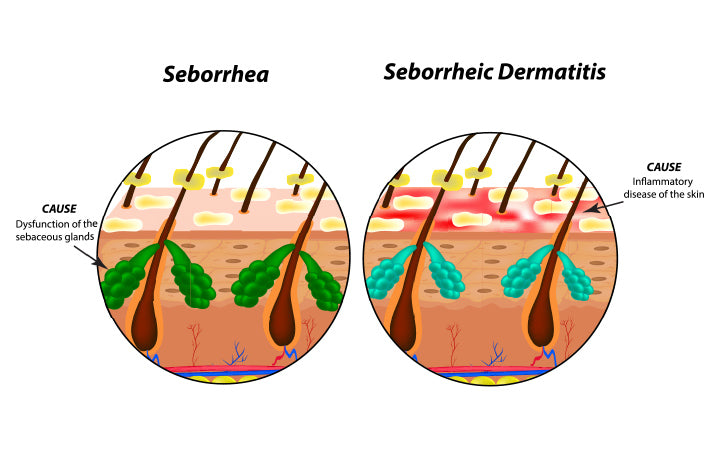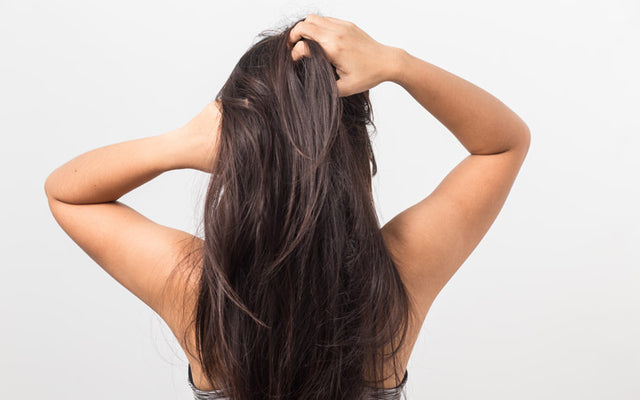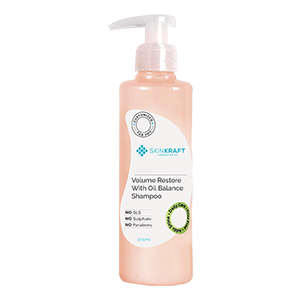Have you ever felt a strange pain at the roots of your hair? And, just by taking down that tight ponytail, you’ve felt relieved too? Well, this pain is real and originates at the nerves of your scalp.
In order to get rid of this pain, you need to first understand why your scalp hurts so often. So, let us get into the details and look at ways to alleviate the pain.
Highlights:
Why Does My Scalp Hurt To Touch?
The pain, burning, or tingling sensation that you may experience when you move your hair comes from the nerves on your scalp. You feel a strong pull on your head. This happens when the blood vessels in the skin of your scalp are inflamed and press the surrounding nerves, causing scalp sensitivity [1].
Why Is My Scalp Tender In One Spot?
Many people complain of scalp tenderness which can be linked with various medical conditions. Tension headaches, autoimmune disorders like psoriasis, headaches caused due to migraine can lead to painful, inflamed scalp. Often, rashes, wounds, sunburns too can cause scalp tenderness.
What Are The Common Causes Of Scalp Pain?
If you are experiencing pain, scaling, or burning sensation on your scalp, it could mean you have an infection or any chronic skin condition. Let's take a look at the different causes.
- Scalp psoriasis (2)
- Seborrheic dermatitis (dandruff) (3)
- Scalp folliculitis
- Temporal arteritis
- Allodynia
- Allergic contact dermatitis
- Stress
- Tight ponytails or complex hairstyles
- Dysesthesia or burning hair syndrome
- Pollution
1. Scalp Psoriasis

A common skin disorder, scalp psoriasis develops in the form of raised, red, scaly patches. It can occur either as a single patch or several patches affecting your entire scalp. Scalp psoriasis can further spread to your forehead, hairline, back of your neck, and the skin around your ears. This condition, however, is not contagious.
Symptoms include fine scaling that looks like dandruff or thick, crusted plaques that cover your scalp area (4) (5). Researchers are not sure about what exactly causes scalp psoriasis. They believe it to be something linked to your immune system that causes skin cells to grow hastily and build up patches. You may hereditarily develop this condition too.
A study on Management of scalp psoriasis states that of those affected by psoriasis, up to 80% will have involvement of the scalp.
Scalp psoriasis can be mild and unnoticeable unless it turns out to be severe. In such cases, it may last for a long time causing thick, crusted sores, accompanied by intense itching. Excessive itchiness and picking at the spots may result in temporary loss of hair too. You need to consult a doctor if you experience such symptoms.
Did You Know?
Scalp psoriasis can be a cause of great physical and social distress. Up to 97% of affected individuals say that the condition interferes in their daily life. (6)
Treatment:
Over-the-counter products such as medicated shampoos, lotions, gels, ointments, and creams containing salicylic acid and clobetasol can be used to treat scalp psoriasis initially (7). You may use products that contain salicylic acid and coal tar can help ease the condition. However, if they don't work, you may need to take prescription medication.
Some of the prescription medicines include:
- Anthralin, an older prescription medication
- Antimicrobials to treat bacterial or yeast infections that occurs with scalp psoriasis
- Calcipotriene, a strong derivative of vitamin D (8) (9)
- Tazarotene, a derivative of vitamin A
- Topical steroids
In case you have moderate to severe scalp psoriasis, your doctor may prescribe oral medications such as:
- Corticosteroids
- Cyclosporine (Sandimmune)
- Methotrexate (Rheumatrex), etc.
If topical treatments don't work, phototherapy can be suggested to slow down the growth of skin cells. Immunotherapy can also help to manage flare-ups in times when symptoms worsen.
2. Seborrheic Dermatitis

Seborrheic dermatitis is a non-contagious, common skin condition that causes itchy red patches, greasy scales, and white or yellow crusty flakes on your scalp. (10) (11)
It's also known as dandruff, cradle cap, seborrhea, etc. Newborns often develop cradle cap that looks like brown crusty scales on the scalp (12).
This condition commonly occurs on your scalp, however, can occur in other parts of your body, especially the ones which have the most sebaceous (oil) gland activity (13) such as the upper back, chest, face, forehead, bends of your arms, legs, below your breasts, etc.
The American Academy of Family Physicians states that infants and adults within the age bracket 30-60 are mostly affected by seborrheic dermatitis. Men and people with oily skin are prone to this condition compared to women.
Researchers are unsure about the exact cause of seborrheic dermatitis. They believe it to be related to genetic factors, stress, cold or dry weather, skin conditions, response to the immune system, among others.
Treatment:
Seborrheic dermatitis can disappear on its own. But it is mostly a long term concern that clears off and flares up every once in a while. Thus, consulting the doctor would be ideal to determine the right treatment.
The first step your doctor might recommend is trying over-the-counter medicines. For scalp, you can use an anti-dandruff shampoo that contains salicylic acid, coal tar, ketoconazole, zinc pyriothione, etc. Shampoo with it twice a week or as directed on the label.
If you want a long-term solution, your doctor may ask you to use anti-fungal shampoos containing ciclopirax (14) or ketoconazole. Check with your doctor for usage.
In case you have moderate to severe seborrheic dermatitis, your doctor may prescribe a shampoo that has betamethasone valerate, clobetasol, fluocinolone. (15)
Read the directions on the label before using.
For kids aged between 8-12 years, using a mild shampoo can work to treat cradle cap. However, in case of any serious symptoms, a doctor-prescribed medication will be the best.
3. Scalp Folliculitis

It's an infection affecting your hair follicles, characterized by small, inflamed bumps developing along your hairline. With time, these bumps grow and turn inflamed. The infection, if left untreated, can spread further and turn into crusty sores. (16) The bumps may appear in clusters and cause itching, may be painful or tender to touch, may ooze pus, and crust over.
The condition can be caused due to several factors including bacteria and yeast infections, exposure to unchlorinated water in hot tubs, ingrown hair, weakened immunity, skin products, tight clothing, certain drugs, etc.
Scalp folliculitis is not contagious. However, infection carrying agents like bacteria or fungus can cause the condition to spread to people when they share hair brushes, towels, and other personal items.
Anyone can get folliculitis. But if you have any medical condition that weakens your resistance power against infections such as diabetes, have acne, take medicines like steroid creams, etc., you can be more prone to scalp folliculitis.
Treatment:
If you have mild scalp folliculitis, you can treat it by resorting to a few easy remedies, including:
- Using a new, clean razor when shaving your head
- Washing your hair with anti-dandruff shampoos
- Using mild antihistamines or topical creams to reduce inflammation
But, it is always advisable to consult your doctor and discuss the symptoms and then go ahead with any treatment. Your doctor may suggest topical antibiotics like clindamycin solution, erythromycin solution, antifungal ointment, topical steroid creams, oral antibiotics, tetracycline, anti-dandruff shampoo containing ciclopirox, light therapy to destroy bacteria and fungus on your scalp, laser hair removal to eliminate hair follicles that are infected, among others.
4. Temporal Arteritis

An autoimmune disorder, temporal arteritis or giant cell arteritis causes the blood vessels to become inflamed or damaged. (17) It usually affects the large and medium-sized arteries that run along both sides of your head. Temporal arteries are known to circulate blood to your head and brain.
This condition has various symptoms such as headache, jaw pain, loss of appetite, vision issues, scalp tenderness, etc. While experts are not sure about the cause of temporal arteritis, they believe it to be linked with immune response problems.
Temporal arteritis is a rare condition, more prevalent in the western countries, more common in females with a male to female ratio of about 1 to 2, states a study by National Organization for Rare Disorders. It does not occur in adults below 50 years of age, and the mean age of onset is 75 years. (18)
Treatment:
The aim of temporal arteritis treatment is to reduce tissue damage that occurs due to insufficient blood flow caused by the condition.
Corticosteroids are the most popular and effective treatment. Besides that, your doctor may prescribe other treatments to reduce the use of corticosteroids gradually. Glucocorticoids, prednisone can help reduce inflammation in your body.
5. Allodynia

It is a type of nerve pain. (19) The condition causes abnormal pain reactions like a sense of discomfort when you move your hair, brushing your hair, cold temperatures, etc.
Allodynia is rare, however, it's common in people with neuropathic pain. As per a study by The Lancet, 15 to 50 percent of people who have neuropathic pain experience allodynia.
This condition can result from several conditions. The most common causes of allodynia include diabetes, shingles, fibromyalgia, migraine headaches, diet and nutrition factors, diabetes, and trauma.
Treatment:
The treatment for allodynia aims at reducing pain with the help of medications and lifestyle changes. Your doctor may recommend taking oral medications such as anticonvulsants to treat seizures, pregabalin to treat fibromyalgia pain, triptans to relieve allodynia that takes place with migraines.
Topical medications in the form of creams or lotions prescribed by your doctor. Some other medications available are capsaicin and lidocaine.
Other than medications, physical therapies, surgery, counseling can also help reduce the pain.
Other Causes
Some of the other causes of scalp pain include:
- Head Injuries
- Extreme temperatures
- Frequent use of helmets
- Regular use of hair dryers, curlers, and flat irons
Note:
Seek immediate medical help if your scalp pain is accompanied by blindness in one or both eyes, jerky movements, unconsciousness, blood or fluid from nose, ears or mouth.
How To Fix Scalp Pain?
1. Treat Underlying Medical Conditions
If scalp pain is a regular symptom for you, consult your dermatologist to understand if there is an underlying medical condition. You can self examine by gently brushing your hair to check if there are any flakes or scales. If you notice them, you could be having eczema, psoriasis, or dandruff.
If your scalp pain is due to a headache, a painkiller can relieve the symptoms. Folliculitis (20) is another inflamed infection of the scalp. Your doctor may prescribe an antibacterial cleanser and an antibiotic to get rid of the infection.
2. Discontinue Harsh Hair Care
If your pain is due to an allergic reaction from a hair care product, the first step is to stop the usage of this product. Give your hair and scalp some rest. Do not apply any oils or conditioners until the condition subsides.
3. Scalp Massage With Essential Oils
Essential oils like lavender and rosemary can heal sores that may be causing a scalp pain. Always use a carrier oil to dilute first. Apply the oil with your fingertips or a cotton ball evenly on your scalp and hair. Gently massage for 15 minutes and wash with a gentle shampoo.
SkinKraft Tip:
Do a patch test (21)to see if the essential oil actually suits your skin. You can apply it on a patch of your skin like the forearm and wait for 24 hours. If you don't see any allergic reaction, hurray, you can use it on your scalp!
4. Topical Home Remedies
A. Lemon Juice
Lemon juice is anti-inflammatory, which means it can relieve scalp pain and tenderness. Besides, lemon is acidic and can restore the pH of your scalp. Add a few drops of lemon juice to your shampoo or conditioner, massage for five minutes and rinse off.
B. Aloe Vera Gel
Aloe vera is anti-inflammatory and extremely soothing for your scalp. Cut open a fresh aloe vera leaf to extract the pulp or juice. Apply it on your scalp and leave it on for 30 minutes. Rinse the gel with plain water. You can shampoo your hair the next day.
5. OTC Medicines/Shampoos
If your scalp pain is due to an infection or dandruff, you can turn to OTC (over the counter) medications and shampoos. Remember to avoid ingredients like alcohol, fragrances, dyes, parabens and sulfates(22) in your shampoos if you have had an allergic reaction with a product.
Always use shampoos and conditioners that suit your hair. If the scalp pain and symptoms like flakes due to dandruff refuse to go away with OTC medication, ask your doctor to give you prescription-strength shampoos.
If your scalp pain is associated with scaly patches, hair loss or bleeding zones, visit your dermatologist.
Why Does My Scalp Hurt When Moving Hair?
At times while pulling your hair, you might experience a painful, tingling sensation. This might be because of aggressive combing, headaches, conditions like eczema, scalp psoriasis, contact allergies, etc.
While you might think that the pain originates from your hair itself, it's the nerves in your scalp that causes the pain. However, it is advisable to check with your doctor to find out the underlying cause and get it treated.
How To Prevent Scalp Pain?
- Always read the labels of hair care products to rule out any allergic ingredients.
- High ponytails, updos, buns, braids, etc. can cause scalp pain. Try and style your hair into loose hairstyles.
- Always brush your hair gently with a wide-toothed comb.
- Keep stress at bay using meditation or yoga.
- Limit your time in the sun to prevent scalp pain and hair damage.
- Step out with your natural hair instead of heat styling your hair every now and then.
When To See A Doctor?
In some cases, these symptoms might be related to other disorders like hair loss, etc.
Check with your doctor if the pain persists for longer periods or in case you have experienced any trauma to the scalp. Post diagnosis, your doctor may prescribe anticonvulsant medication like gabapentin to treat neuropathic pain or recommend topical skin creams in case of skin conditions.
Frequently Asked Questions About Scalp Pain
What deficiency causes scalp pain?
Low levels of Vitamin B2, B6 and B3 and zinc are some of the major reasons behind scalp issues. Eating a balanced, nutritious diet can help in maintaining good scalp health. Include nuts, seeds, leafy greens vegetables, fish, meat, poultry in your diet.
What are the potential complications of scalp pain?
Most of the time, pain in your scalp is caused by different chronic skin conditions or severe infection. However, if you fail to seek treatment, it might give rise to severe complications and even cause permanent damage at times. Some of the potential complications include:
- Brain damage
- Blindness
- Paralysis
- Chronic headaches
- Spread of infection
Wrapping Up
Scalp pain is a temporary scenario arising mostly from tight hairstyles. However, a number of other conditions like infections, dermatitis can also lead to scalp soreness and tenderness. The one that stems from a harsh hair care ingredient can be treated using mild shampoos. However, chronic scalp pain deserves medical attention. Consult your doctor to determine the underlying cause.
1. Sensitive Scalp (2012)
https://www.ncbi.nlm.nih.gov/pmc/articles/PMC3500070/
2. Diagnosis and management of psoriasis (2017)
https://www.ncbi.nlm.nih.gov/pmc/articles/PMC5389757
3. DANDRUFF: THE MOST COMMERCIALLY EXPLOITED SKIN DISEASE (2010)
https://www.ncbi.nlm.nih.gov/pmc/articles/PMC2887514/
4. RECENT DEVELOPMENTS IN THE TREATMENT OF SCALP PSORIASIS: A REVIEW (2019)
https://ijpsr.com/bft-article/recent-developments-in-the-treatment-of-scalp-psoriasis-a-review/
5. Manifestations and Management of Difficult-to-Treat Psoriasis (2018)
https://journals.lww.com/jdnaonline/fulltext/2018/07000/manifestations_and_management_of.2.aspx
6. Management of scalp psoriasis: current perspectives (2016)
https://www.ncbi.nlm.nih.gov/pmc/articles/PMC5683126/
7. Topical Therapies in Psoriasis (2017)
https://www.ncbi.nlm.nih.gov/pmc/articles/PMC5518573/
8. Calcipotriol Solution for the Treatment of Scalp Psoriasis: Evaluation of Efficacy, Safety and Acceptance in 3,396 Patients (2001)
https://www.karger.com/Article/Abstract/51731
9. Derivatives of cholecalciferol in the treatment of psoriasis (2003)
10. Seborrheic dermatitis: Overview (2018)
https://www.ncbi.nlm.nih.gov/books/NBK532846/
11. Seborrheic Dermatitis (2010)
https://www.ncbi.nlm.nih.gov/pmc/articles/PMC2888552/
12. Cradle Cap (2021)
https://ada.com/conditions/cradle-cap/
13. Seborrheic Dermatitis (2021)
https://www.ncbi.nlm.nih.gov/books/NBK551707/
14. Clinical efficacies of shampoos containing ciclopirox olamine (1.5%) and ketoconazole (2.0%) in the treatment of seborrhoeic dermatitis (2007)
https://pubmed.ncbi.nlm.nih.gov/17520465/
15. Topical anti‐inflammatory agents for seborrhoeic dermatitis of the face or scalp (2014)
https://www.ncbi.nlm.nih.gov/pmc/articles/PMC6483543/
16. Infections, Infestations and Neoplasms of the Scalp (2017)
https://www.intechopen.com/chapters/53947
17. Research in Temporal Arteritis Suggests Link with Infection, Autoimmune Disease (2015)
18. Temporal Arteritis ( 2021)
https://www.ncbi.nlm.nih.gov/books/NBK459376/
19. Allodynia (2021)
https://www.ncbi.nlm.nih.gov/books/NBK537129/
20. Folliculitis (2021)
https://www.ncbi.nlm.nih.gov/books/NBK547754/
21. Patch tests (2013)
https://www.ncbi.nlm.nih.gov/pmc/articles/PMC3900336/
22. Shampoo and Conditioners: What a Dermatologist Should Know? (2015)
Recommended Products
Was this Article helpful?
- Least helpful
- Most helpful











